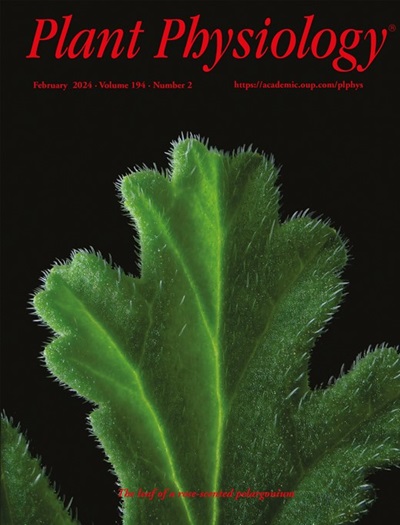转录因子bZIP44通过激活脂肪酸DESATURASE3调控牡丹α-亚麻酸积累
IF 6.9
1区 生物学
Q1 PLANT SCIENCES
引用次数: 0
摘要
α-亚麻酸(ALA)是一种对改善人体膳食营养至关重要的必需脂肪酸。由于ALA只能从膳食中获得,因此开发富含ALA的生物资源势在必行。牡丹(Paeonia × suffruticosa)是一种很有前途的木本油料作物,其籽油中ALA含量特别丰富。在本研究中,我们鉴定了牡丹中碱性亮氨酸拉链转录因子(bZIP) PsbZIP44是种子中ALA积累的关键调控因子。PsbZIP44在拟南芥(Arabidopsis thaliana)中的异源表达促进了ALA的积累,而牡丹种子中的短暂沉默降低了ALA的水平。此外,我们发现另一个bZIP转录因子PsbZIP9在种子发育后期通过抑制PsbZIP44的活性负向调节ALA的生物合成。基于这些发现,我们提出了一个牡丹种子中脂肪酸DESATURASE3 (PsFAD3)调控模型,其中PsbZIP44在种子发育早期激活PsFAD3促进ALA的生物合成,而PsbZIP9在种子发育后期抑制PsbZIP44的活性,限制ALA的积累。本研究突出了转录因子在种子发育中的协同作用,揭示了PsFAD3的调控机制,增强了我们对ALA生物合成的认识。研究结果为提高牡丹籽油的品质提供了依据。本文章由计算机程序翻译,如有差异,请以英文原文为准。
The transcription factor bZIP44 regulates α-linolenic acid accumulation by activating FATTY ACID DESATURASE3 in tree peony
α-Linolenic acid (ALA) is an essential fatty acid crucial for improving dietary nutrition in humans. Since ALA can only be obtained from dietary sources, developing ALA-rich biological resources is imperative. The seed oil of tree peony (Paeonia × suffruticosa), a promising woody oil crop, is particularly rich in ALA. In this study, we identified PsbZIP44, a basic leucine zipper transcription factor (bZIP) in tree peony, as a key regulator of ALA accumulation in seeds. Heterologous expression of PsbZIP44 in Arabidopsis (Arabidopsis thaliana) promoted ALA accumulation and transient silencing in tree peony seeds decreased ALA levels. Additionally, we found that another bZIP transcription factor, PsbZIP9, negatively regulates ALA biosynthesis by inhibiting PsbZIP44 activity during the late stages of seed development. Based on these findings, we propose a model for FATTY ACID DESATURASE3 (PsFAD3) regulation in tree peony seeds, in which PsbZIP44 activates PsFAD3 during early seed development to promote ALA biosynthesis, while PsbZIP9 suppresses PsbZIP44 activity in later stages, limiting ALA accumulation. This study highlights the synergistic role of transcription factors in seed development, reveals the regulatory mechanisms of PsFAD3, and enhances our understanding of ALA biosynthesis. These findings provide a foundation for improving the quality of tree peony seed oil.
求助全文
通过发布文献求助,成功后即可免费获取论文全文。
去求助
来源期刊

Plant Physiology
生物-植物科学
CiteScore
12.20
自引率
5.40%
发文量
535
审稿时长
2.3 months
期刊介绍:
Plant Physiology® is a distinguished and highly respected journal with a rich history dating back to its establishment in 1926. It stands as a leading international publication in the field of plant biology, covering a comprehensive range of topics from the molecular and structural aspects of plant life to systems biology and ecophysiology. Recognized as the most highly cited journal in plant sciences, Plant Physiology® is a testament to its commitment to excellence and the dissemination of groundbreaking research.
As the official publication of the American Society of Plant Biologists, Plant Physiology® upholds rigorous peer-review standards, ensuring that the scientific community receives the highest quality research. The journal releases 12 issues annually, providing a steady stream of new findings and insights to its readership.
 求助内容:
求助内容: 应助结果提醒方式:
应助结果提醒方式:


